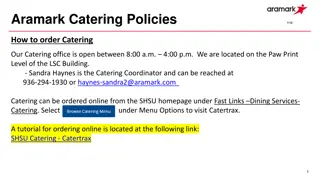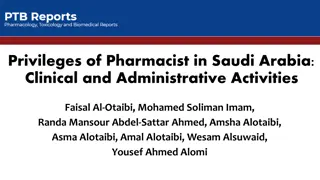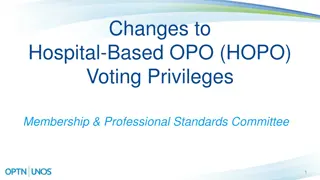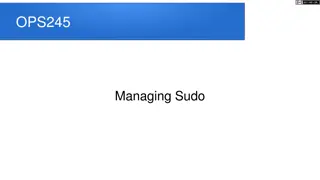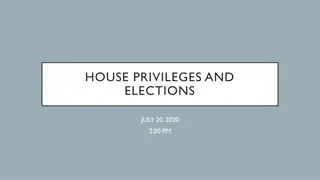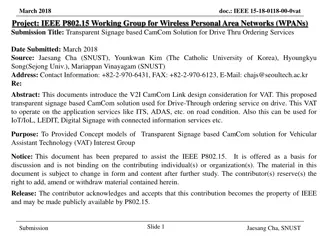
Understanding RD Order Writing Privileges in Long-Term Care Facilities
Explore the rules and benefits of allowing registered dietitians to write nutrition orders in long-term care settings. Learn about state regulations, delegation by attending physicians, and the importance of efficient order writing practices for better patient care outcomes.
Download Presentation

Please find below an Image/Link to download the presentation.
The content on the website is provided AS IS for your information and personal use only. It may not be sold, licensed, or shared on other websites without obtaining consent from the author. Download presentation by click this link. If you encounter any issues during the download, it is possible that the publisher has removed the file from their server.
E N D
Presentation Transcript
RD Ordering Writing Privileges GETTING STARTED GETTING STARTED LESLIE BELL, RDN/LD LESLIE BELL, RDN/LD
Regulation F808 Regulation F715 Know the Rules State Law
Regulation F808 F808 483.60(e) Therapeutic Diets 483.60(e)(1) Therapeutic diets must be prescribed by the attending physician. 483.60(e)(2) The attending physician may delegate to a registered or licensed dietitian the task of prescribing a resident s diet, including a therapeutic diet, to the extent allowed by State law. GUIDANCE 483.60(e)(1)-(2) If the residents attending physician delegates this task he or she must supervise the dietitian and remains responsible for the resident s care even if the task is delegated. The physician would be able to modify a diet order with a subsequent order, if necessary. NOTE: The terms attending physician or physician also includes a non-physician provider (physician assistant, nurse practitioner, or clinical nurse specialist) involved in the management of the resident s care.
Dietitians may write nutrition related orders when the attending physician has delegated that task to the dietitian. What is legal in long term care? The prescribing doctor (or nurse practitioner or physician s assistant) are still ultimately responsible, for orders, however, orders do not have to be cosigned. Providers have the choice to delegate order writing privileges to the dietitian
Benefits to having dietitians write nutrition orders Better patient care. Orders are expeditated in timely fashion. No more waiting 1 week or longer to start an oral nutrition supplement. Cost savings due to reduction in food and supplement waste. Supplements are discontinued promptly. Diets are changed quickly. Improved outcomes, better acceptance of diet or supplement due to recent change made by RD, reducing chance of weight loss/pressure injuries
Are RDs allowed to write orders in your state? Does your facility or the company you contract with have a corporate dietitian? If there is a corporate RD, verify if RD order writing is allowed in that company. Is there a policy in place already? If not, would they allow you to get one started? Step one Review benefits and legality of RD order writing privileges with administrator and director of nursing If able, review with medical director
Step Two Review S&S RD order writing privileges policy and procedure with administrator and director of nursing. Do they have any concerns? Address their concerns. Have copy of regulation F808 and state regulation handy just in case Get the S&S policy and procedure signed by the medical director
Ask all providers to delegate the task of writing diet orders and other nutrition related orders for their residents to the RD Step Three Communicating with providers form letter works well. Can talk to providers in person if they come into the facility. Work with medical records to ensure all providers who contract with the facility are contacted. Medical records can help distribute the letters. RD order writing policy and procedure should be sent with the letters.
Step Four Policy and Procedure has been approved and signed Form letters have been returned from majority of providers Educate nursing staff. Work with director of nursing on this. How would he/she like the education dispersed? Maybe a read and sign inservice? or an education from the RD How will you communicate the orders? Will the facility allow you, the RD to enter orders into PCC? Ideally the RD should be the one entering orders in PCC to ensure accuracy and timely implementation of the order
Familiarize yourself with corporation policies before starting, make sure the company approves. Bring it up in a nutrition at risk meeting. Attend a QAPI meeting, visit with the medical director. The following companies will not allow dietitians to write orders: Life Care and Good Samaritan The following companies have policies in place for order writing privileges: Cascadia, Advanced Health Care, Prestige S&S is here to help! Tips





